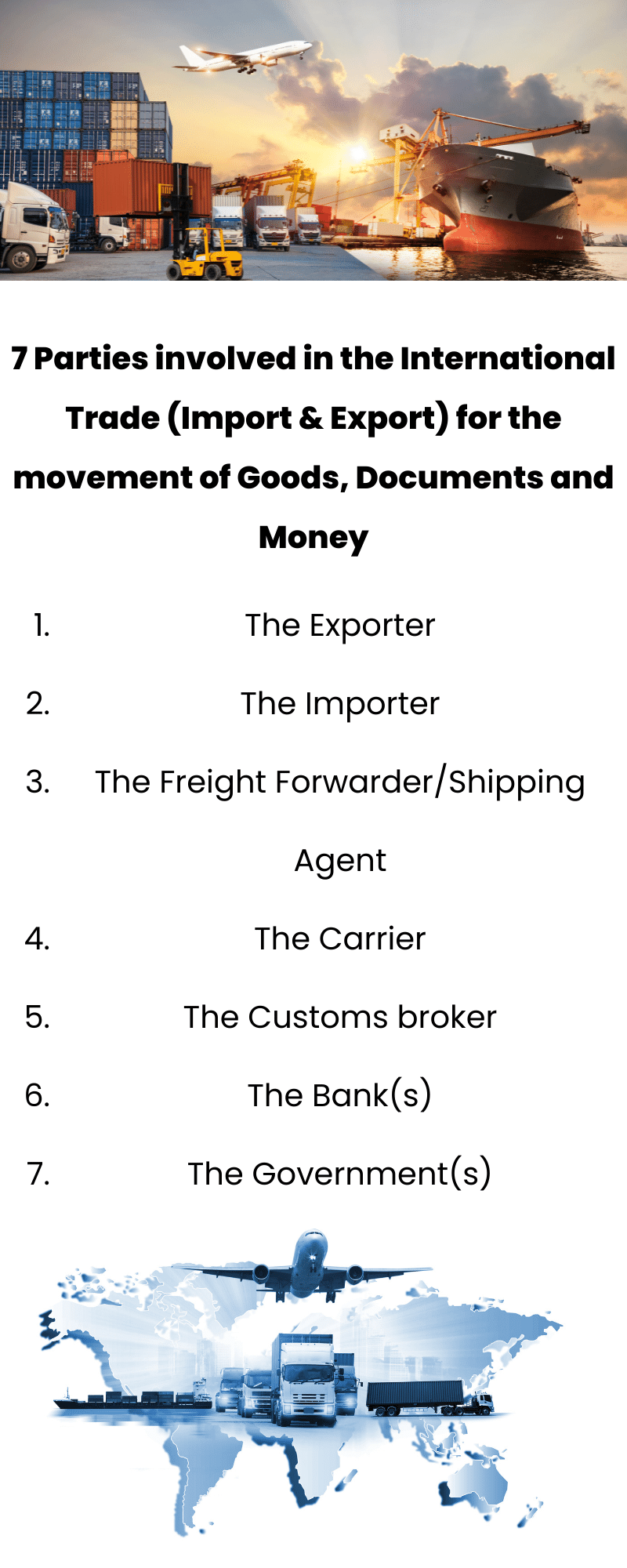There are at least 7 important parties to work with in the international trade (import & export) for the movement of goods, documents and money.
- The exporter
- The importer
- The freight forwarder/shipping agent
- The carrier
- The customs broker
- The bank(s)
- The government(s).
Different participants play different roles at different times in the process of an international trade transaction.
Table of Contents
- 1st in Important Parties to Work: The Exporter
- The Importer
- The Freight Forwarder/Shipping Agent
- The Carrier
- The Customs Broker
- The Bank(s)
- Governments
1st in Important Parties to Work: The Exporter
The exporter’s primary function is to sell his/her goods in international markets.
Exporter need to have right mix of price, product, place and promotion (4P’s) to make the goods competitive in the new international marketplace.
The exporter is responsible for determining the selling price, the product development, the distribution and the promotion to make the product demandable in the international market.
As exporting companies create jobs, bring wealth into a country, and help with the balance of payments, all governments look favorably on exports and assist their exporters in the international trade.
The Importer
The role of the importer is to find goods and services that are needed or wanted by domestic consumers and industry, and bring them to market in good order.
There are three types of importers:
- Those that provide finished industrial and consumer goods to individuals and to other wholesalers and retailers.
- Those that provide intermediate (semi-finished) goods required to complete the manufacture of the finished product.
- Those that provide raw materials used in either semi-finished or finished products.
The Freight Forwarder/Shipping Agent
If we see most international shipments, we can see it involve more than one mode of transport and it would be nearly impossible for an individual exporter or importer to arrange with the various carriers, to pick up, document, insure, transport, report to customs and deliver the goods to destination.
A freight forwarder acts as a single touch point and is capable of providing the exporter or importer with a single document covering the multiple modes of transportation that may be required to move the goods.
The freight forwarder takes all the responsibility of the transportation of the goods across borders allowing the importer and exporter to focus on the sales of the product and increase their core business.
The Carrier
The Carrier actually owns the vehicles, planes, ships, railcars and trucks that carry the goods.
Each shipment accepted for carriage by the carrier must be documented.
Only shipments that are properly packaged, packed, labeled and documented are accepted for shipment. For these reasons, carriers prefer to deal with international freight forwarders who ensure the goods are “ready for carriage.”
The Customs Broker
Customs brokers clear goods through customs, and account for shipments, assessing duty and taxes on behalf of their clients. The customs broker works on behalf of the importer and exporter in the release of goods and work with all customs procedures to release the goods.
The Bank(s)
In import & export trade, a major issue is that of payment to the exporter (seller) by the importer (buyer).
Often the exporter does not want to commit the goods to shipment unless it has some guarantee that payment will be made. Equally, the importer would not wish to pay for the goods unless he/she receives some guarantee that the goods have actually been shipped.
This is where a third party, the bank, enters the picture to mitigate the risk.
Governments
Governments have a strong involvement in the international trade.
The government of the exporting country will have export-reporting requirements. If the goods travel through a third or fourth country on their journey from seller to buyer, the governments of each of those “transit” countries will have regulations that must be met and obliged.
Finally, the government of the importing nation has something to say about the types and quantities of goods that enter its country and the duties and taxes that must be paid, safety and security regulations that must be followed, data collection and delivery laws that must be obeyed.

